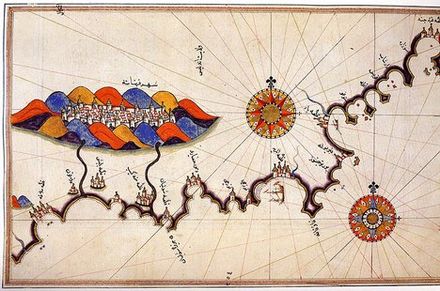- Nasrid–Ottoman relations
-
Nasrid–Ottoman relations occurred during the last years of the 15th century, as the Nasrid dynasty attempted to obtain Ottoman Empire help against the Reconquista in Spain.
Contents
Context
The Ottomans had been extending into the western Mediterranean recently, especially with the Ottoman invasion of Otranto in Italy in 1480-81, interrupted by the death of Sultan Mehmed II.[1]
This Turkish expansion represented an increased threat to the Spanish Crown under Fernando, which had to deal with a Muslim presence in southern Spain, with the Kingdom of Cordoba.[1] This encouraged Spain to deal with the Mudejar in a more severe manner, by disarming them, and prohibiting their access to fortresses.[1]
The Turks continued their forays into the western Mediterranean. There were rumours of the coming of Turkish fleet in 1484-1484, and they attacked Malta in 1488.[1] Fernando reinforced the defenses of Sicily as a response, and even made a temporary alliance with the Mamluks against the Ottomans from 1488 until 1491, shipping wheat and offering a fleet of 50 caravels against the Ottomans.[1]
Diplomatic mission and fleet action
 The last Nasrid ruler, Boabdil, requested Ottoman and Mamluk help against Spain.
The last Nasrid ruler, Boabdil, requested Ottoman and Mamluk help against Spain.
In 1487, the Nasrids of Granada had sent envoys to the Ottomans, and also to the Mamluks, in order to obtain help against the Spanish offensive.[1][2] One envoy to the Mamluks seems to have been sent, in the person of the Granadan Ibn al-Azraq.[3] Two envoys were sent to the Ottoman Empire, one from Játiva, and a certain Pacoret from Paterna.[1]
Plans were apparently made for ottoman troops to be disembarked in Valencia, from where they would join 200,000 Mudejars against the Spanish.[1] Bayezit II was however much too busy in the east, especially with the Ottoman–Mamluk War going on, to lend any major support.[1][4] As a response to the Nasrid plea however, Bayezit II sent the Ottoman admiral Kemal Reis with a fleet to the west Mediterranean. This was the first Ottoman involvement in the Western Mediterranean.[5] He is thought to have made contact with Muslims of Granada on the coast of Spain.[1] Until 1495, Kemal reis was active in raiding the Spanish coast, his fleet being based in Bône, Bougie and Jerba.[1] Kemal also ferried numerous Muslim refugees from the coast of Spain to Northern Africa.[5] Kemal Reis was then recalled by Bayezit in 1495.[1]
Granada would finally fall to the Spanish in 1492, with the Battle of Granada.[1] The Mudejars would continue to have contacts with the Ottomans, as in 1502.[1] Boabdil would emigrate to North Africa with 6,000 other Muslims in 1493.[6]
Reception of refugees
Numerous refugees from the Nasrid kingdom of Granada we allowed by the Ottomans to settle as refugees in the Ottoman Empire. Among them was the Jew Moses Hamon, who became a famous doctor at the Ottoman court.[7] Bayezid II sent out proclamations throughout the empire that the refugees were to be welcomed. He granted the refugees the permission to settle in the Ottoman Empire and become Ottoman citizens. He criticized the conduct of Ferdinand II of Aragon and Isabella I of Castile in expelling a class of people so useful to their subjects. "You venture to call Ferdinand a wise ruler," he said to his courtiers — "he who has impoverished his own country and enriched mine!".[8]
Aftermath
The Spanish victory in the Iberian peninsula, and the perceived threat of subsequent Spanish incursions in the Muslim state of northern Africa, would lead to further appeals for Ottoman involvement.[4] The Spaniards would effectively set foot in Northern Africa with the capture of Melilla in 1497.[6]
Notes
- ^ a b c d e f g h i j k l m n The Muslims of Valencia in the age of Fernando and Isabel by Mark D. Meyerson p.64ff
- ^ The Cambridge history of Islam by P. M. Holt, Peter Malcolm Holt, Ann K. S. Lambton, Bernard Lewis p.312
- ^ Muslims in Spain, 1500 to 1614 by Leonard Patrick Harvey p.335
- ^ a b "When Granada fell to the Spaniards in 1492 and the Muslim states in North Africa began to face the possibility of Christian invasions, the pressure for Ottoman intervention increased in the face of numerous appeals for help." History of the Ottoman Empire and modern Turkey, Vol 1 by Stanford J. Shaw p.76ff
- ^ a b An Historical Geography of the Ottoman Empire p.99
- ^ a b A history of the Maghrib in the Islamic period Jamil M. Abun-Nasr p.146
- ^ Ottoman medicine: healing and medical institutions, 1500-1700 by Miri Shefer Mossensohn p.40
- ^ The Jewish encyclopedia: a descriptive record of the history, religion, literature, and customs of the Jewish people from the earliest times to the present day, Vol.2 Isidore Singer, Cyrus Adler, Funk and Wagnalls, 1912 p.460
Categories:
Wikimedia Foundation. 2010.

